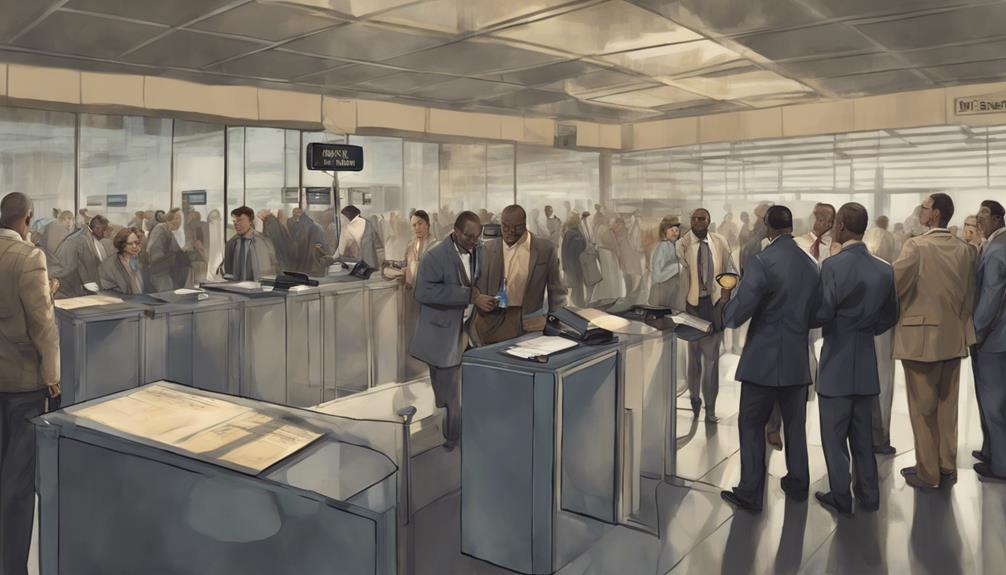When a future employer conducts a background check, they mainly look at your employment history, criminal record, and online presence to evaluate your honesty and reliability. They verify your credentials, past behaviors, and social media profiles for professionalism. Relevancy of any past issues is considered, and transparency can work in your favor. If you’re curious about what else they might uncover or how to prepare, there’s more to explore beyond this overview.
Key Takeaways
- Employers verify your employment history, education, and credentials to assess honesty and reliability.
- Criminal background checks reveal past offenses, but relevance and rehabilitation influence hiring decisions.
- Identity verification confirms your personal information to prevent misrepresentation or fraud.
- Online presence is reviewed to evaluate professionalism and social conduct that may impact reputation.
- Additional checks may include financial history and social media activity to evaluate overall suitability for the role.

When you’re applying for a new job, understanding how background checks work can give you an edge and prepare you for what employers might review. One of the key areas they examine is your employee honesty. Employers want to see if you’ve been truthful on your resume and during interviews, so they often verify details like your employment history, education, and credentials. If discrepancies pop up, it could raise red flags about your integrity. Being honest about your experience and qualifications helps build trust and shows that you’re reliable, which is essential for most roles.
Another pivotal aspect of your background check is your criminal history. Employers review this to assess your past behavior and determine if you’re a good fit for their team. It’s important to remember that having a criminal record doesn’t automatically disqualify you, but what they see can influence their decision. They’ll consider the nature of any offenses, how long ago they occurred, and whether they’re relevant to the job. Some companies may have policies that restrict hiring individuals with certain convictions, especially if the role involves working with vulnerable populations or handling sensitive information. Transparency is beneficial; if you have a criminal record, being upfront about it during the application process can sometimes work in your favor, especially if you’ve taken steps to rehabilitate and demonstrate your growth.
Background checks also include verifying your identity and checking for any records that might indicate fraud or misrepresentation. This process helps employers confirm that the information you provided is accurate and complete. They might also look into your financial history, particularly if the job involves handling money or sensitive data, to identify potential risks like financial instability or fraud. Additionally, understanding the power of decluttering can help you maintain a tidy online presence, which employers also review as part of their screening process. It’s worth noting that some companies review your social media profiles or online presence as part of their screening process, looking for signs of professionalism or behaviors that could impact their reputation.
Frequently Asked Questions
Can a Background Check Reveal Social Media Activity?
A background check can reveal some social media activity, especially if your privacy settings are lax. Employers often review your online reputation to gauge your professionalism and character. While social media privacy settings can limit what’s visible, publicly shared posts or comments are accessible. Be mindful of what you share online, as your online reputation can influence their perception of you, even if you think your social media is private.
How Accurate Are Criminal Record Reports?
Think of criminal record reports as a mirror reflecting your past—sometimes clear, sometimes distorted. They’re generally accurate but can have discrepancies due to reporting errors or outdated info. While most reports are reliable, criminal record discrepancies can occur, so it’s smart to review your report regularly. Address any errors promptly to guarantee your background check presents an accurate picture, helping you avoid surprises during job applications.
Do Background Checks Include Financial History?
Background checks often include your financial history, especially for roles involving financial responsibility. They may assess your creditworthiness to see how you handle debt and obligations. Employers also conduct education verification to confirm your credentials. These checks help them evaluate your trustworthiness and stability. So, be prepared for your financial and educational background to play a role in the hiring process, giving employers a clearer picture of your overall profile.
Are Previous Employment Gaps Visible?
Think of employment gaps as silent pauses in your career symphony—they can be visible in a background check. Employers often see these gaps and may look for gap explanations to understand your story better. If you’re transparent about why you took time off, it shows honesty and resilience. Clear gap explanations help employers see you as a proactive candidate, turning potential doubts into a affirmation of your character.
How Long Does a Background Check Take?
A background check typically takes anywhere from a few days to a week, depending on the depth of the background check procedures. You should keep in mind that the hiring timeline may be delayed if the process encounters delays, such as difficulty verifying information or accessing records. Staying patient and responsive can help speed things up, but overall, plan for about a week for most background checks to be completed.
Conclusion
So, next time you’re worried about a background check, remember it’s just a glimpse into your story, not the whole book. Your future employer wants to see your potential, your honesty, and how you’ve grown. Are you showcasing your best qualities? Keep your records clean and be confident in what you bring to the table. After all, isn’t it better to be trusted than just qualified? Your future starts now—make it count.









